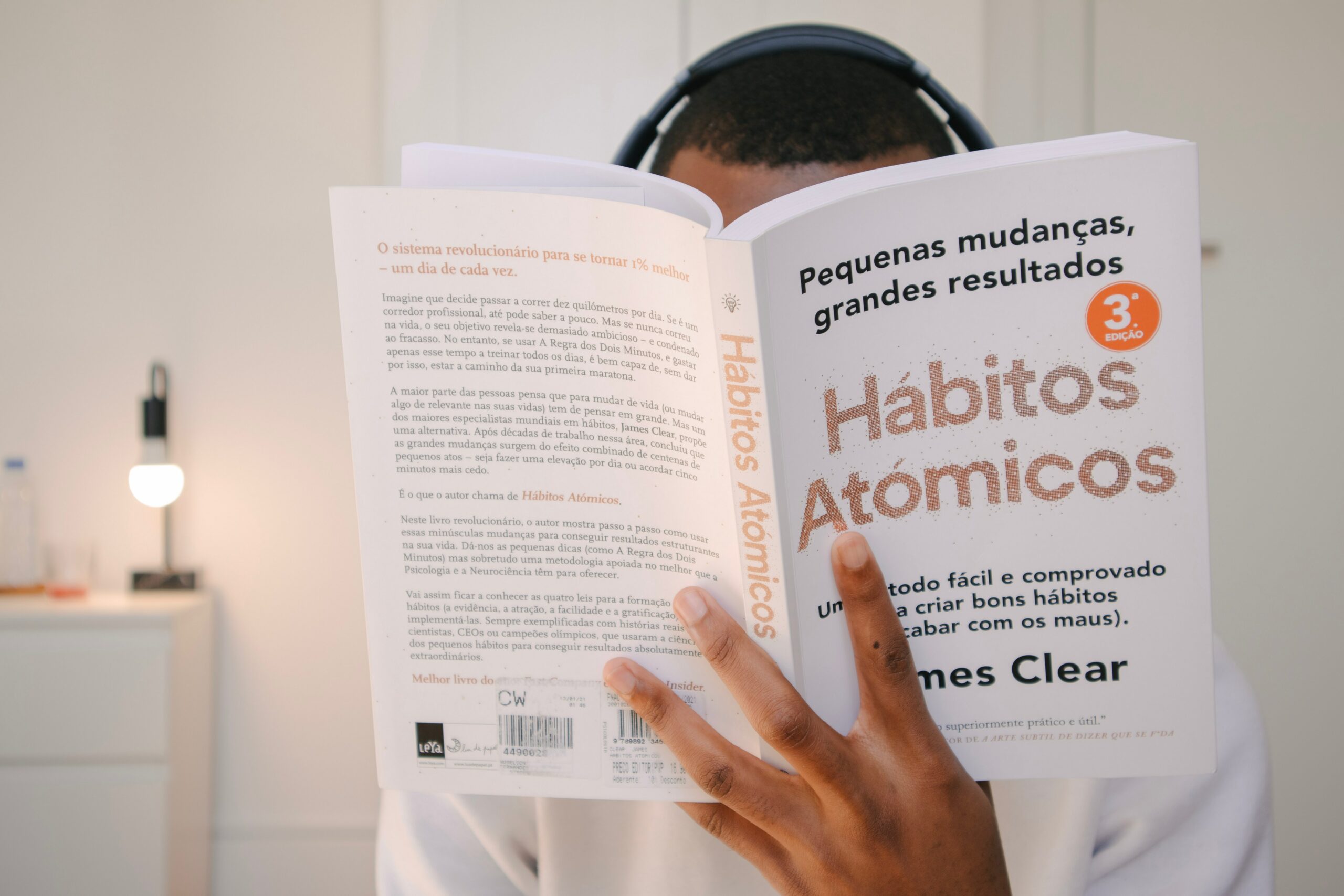Vídeo | 10 tips for managing your time as a language learner
Este vídeo do poliglota Steve Kauffman apresenta estratégias de gerenciamento de tempo para o aprendizado de idiomas. Aborda como evitar distrações, criar cronogramas e estabelecer metas. O autor compartilha métodos para integrar o aprendizado na rotina diária, como ouvir o idioma durante tarefas domésticas ou exercícios. Discute a importância de ter locais específicos para diferentes atividades de estudo e como equilibrar multitarefas com períodos de concentração. O texto também fala sobre o uso de ferramentas para medir o progresso, a importância de manter a motivação e saber quando fazer pausas. Essas técnicas visam otimizar o tempo gasto com o idioma e melhorar a eficácia do aprendizado.
| Audio | |
|---|---|
Normal | Slow |
| English Transcript | Tradução |
| Today, I want to talk about time management and language learning. | Hoje, quero falar sobre gerenciamento de tempo e aprendizado de idiomas. |
| You've heard me say before that the three keys to success in language learning are time, the amount of time we spend with the language. | Você já me ouviu dizer antes que as três chaves para o sucesso no aprendizado de idiomas são o tempo, a quantidade de tempo que passamos com o idioma. |
| Therefore, time management becomes quite important. | Portanto, o gerenciamento do tempo se torna bastante importante. |
| Our attitude towards the task and towards the language and motivation in general. | Nossa atitude em relação à tarefa e ao idioma e motivação em geral. |
| And third of all, that ability to notice what's happening in the language, which I will describe in another video and which is very much related to our attitude and how much time we spend with the language. | E em terceiro lugar, aquela capacidade de perceber o que está acontecendo no idioma, que descreverei em outro vídeo e que está muito relacionada à nossa atitude e quanto tempo passamos com o idioma. |
| But let's just deal with this time issue. | Mas vamos apenas lidar com essa questão do tempo. |
| To me, the first thing when it comes to time management is to avoid distraction. | Para mim, a primeira coisa quando se trata de gerenciamento de tempo é evitar distrações. |
| And that means to know why you are learning the language, to be convinced that this is an important thing for you to do so that you stay in the moment. | E isso significa saber por que você está aprendendo o idioma, estar convencido de que isso é algo importante para você fazer, para que você permaneça no momento. |
| You don't begrudge the time that you spend on the language, listening to the language, reading the language, speaking the language. | Você não se ressente do tempo que passa no idioma, ouvindo o idioma, lendo o idioma, falando o idioma. |
| Even though you may not realize, or you may not feel as if you're improving, you have to stay within the moment. | Mesmo que você não perceba, ou não sinta como se estivesse melhorando, você tem que permanecer no momento. |
| You have to think this is where I want to be now. | Você tem que pensar que é aqui que eu quero estar agora. |
| I don't want to be somewhere else so I can avoid all those distractions because I'm totally into what I'm doing. | Eu não quero estar em outro lugar, então posso evitar todas essas distrações porque estou totalmente envolvido no que estou fazendo. |
| So that motivation, that sense of wanting to be in that language learning moment is a big part of successful time management when it comes to language learning. | Então, essa motivação, esse sentimento de querer estar naquele momento de aprendizado de idiomas é uma grande parte do gerenciamento de tempo bem-sucedido quando se trata de aprendizado de idiomas. |
| Second of all, set a schedule. | Em segundo lugar, estabeleça um cronograma. |
| There are different activities, and in my case, I have different schedules for different activities. | Existem diferentes atividades e, no meu caso, tenho diferentes cronogramas para diferentes atividades. |
| So, when I wake up in the morning, I listen. | Então, quando acordo de manhã, eu escuto. |
| I listen while getting the dishes out for breakfast, while preparing breakfast, and I also clean up after breakfast, and I listen while I do these things. | Eu escuto enquanto tiro os pratos para o café da manhã, enquanto preparo o café da manhã, e também limpo depois do café da manhã, e escuto enquanto faço essas coisas. |
| If I'm ever in the car, I listen. | Se eu estiver no carro, eu escuto. |
| So that's my listening schedule. | Então esse é meu cronograma de escuta. |
| Very often I work out in the evening and do my kettlebell routine watching Heather Robertson or Juice and Toya, but while doing that, I listen, I have a special set of headphones that, or at least I hook them up to my ear so they don't fall out. | Muito frequentemente eu me exercito à noite e faço minha rotina de kettlebell assistindo Heather Robertson ou Juice and Toya, mas enquanto faço isso, eu escuto, tenho um conjunto especial de fones de ouvido que, ou pelo menos os prendo na minha orelha para que não caiam. |
| Those are my schedules for listening, but I have a schedule for working on my iPad, doing the lesson. | Esses são meus cronogramas para escuta, mas tenho um cronograma para trabalhar no meu iPad, fazendo a lição. |
| I do that typically around five o'clock in the evening, five or six in the evening, sometimes after dinner. | Eu faço isso tipicamente por volta das cinco horas da tarde, cinco ou seis da tarde, às vezes depois do jantar. |
| So that's my schedule for my iPad linking type activities. | Então esse é meu cronograma para minhas atividades de ligação no iPad. |
| But I also read a little bit before going to bed. | Mas também leio um pouco antes de ir para a cama. |
| Typically I'll have beside my bed, both say a book that I'm reading in English, which is more pleasurable in a way. | Tipicamente, terei ao lado da minha cama, tanto um livro que estou lendo em inglês, o que é mais prazeroso de certa forma. |
| But I'll also have a book in the target language by my bed. | Mas também terei um livro no idioma-alvo ao lado da minha cama. |
| So that's another time set aside for my specific language learning tasks. | Então esse é outro momento reservado para minhas tarefas específicas de aprendizado de idiomas. |
| Stay on task, use goals, use the various prods, the statistics that we've built into LingQ, like a streak. | Mantenha-se na tarefa, use metas, use os vários estímulos, as estatísticas que construímos no LingQ, como uma sequência. |
| If you signed up for a streak, you have to maintain your streak. | Se você se inscreveu para uma sequência, você tem que manter sua sequência. |
| You have to do something every day. | Você tem que fazer algo todos os dias. |
| You have to maintain a certain activity level. | Você tem que manter um certo nível de atividade. |
| I have set a goal, for example, because say the longer term goal is that my wife and I are visiting Turkey. | Eu estabeleci uma meta, por exemplo, porque digamos que o objetivo de longo prazo é que minha esposa e eu visitemos a Turquia. |
| So I said when I was at about 8,000 words, from five years ago when I did Turkish, I said, I want to move that up to 35,000 known words between June and September, the end of September, which I have done. | Então eu disse quando estava com cerca de 8.000 palavras, de cinco anos atrás quando fiz turco, eu disse, quero aumentar isso para 35.000 palavras conhecidas entre junho e setembro, o final de setembro, o que eu fiz. |
| I'm now at 35,000 known words. | Agora estou com 35.000 palavras conhecidas. |
| It's a specific goal. | É uma meta específica. |
| It helps me stay on task, which is a big part of time management. | Isso me ajuda a me manter na tarefa, o que é uma grande parte do gerenciamento de tempo. |
| Another thing, do the important things first, prioritize your activities. | Outra coisa, faça as coisas importantes primeiro, priorize suas atividades. |
| So since my goal was to achieve 35,000 known words in Turkish, every day, the first thing I did was to knock in 200 or so new known words, the remaining additional known words would come from my, you know, listening and reading activities, particularly my reading activities. | Então, como meu objetivo era alcançar 35.000 palavras conhecidas em turco, todos os dias, a primeira coisa que eu fazia era inserir 200 ou mais novas palavras conhecidas, as palavras conhecidas adicionais restantes viriam das minhas atividades de escuta e leitura, particularmente minhas atividades de leitura. |
| But in order to get that 200 a day, you know, well on my way to achieving that, I would go to, typically, you know, five minute long lessons and in our, lesson page on the iPad, a little right hand corner, I can go through my vocabulary list. | Mas para conseguir essas 200 por dia, você sabe, bem no meu caminho para alcançar isso, eu iria, tipicamente, você sabe, lições de cinco minutos e em nossa página de lições no iPad, no canto superior direito, posso percorrer minha lista de vocabulário. |
| I'll go through there looking at either new words or links that I've previously saved and move as many of them as I can to known. | Vou passar por lá olhando para palavras novas ou links que salvei anteriormente e mover o máximo possível deles para conhecidos. |
| Admittedly, easier to do in Turkish than perhaps in some other languages because there are so many forms of the same word, especially verbs, but that was my goal. | Admitidamente, mais fácil de fazer em turco do que talvez em alguns outros idiomas porque há tantas formas da mesma palavra, especialmente verbos, mas essa era minha meta. |
| So I get rid of that task first, every day. | Então eu me livro dessa tarefa primeiro, todos os dias. |
| Next tip is with regard to speaking, speaking is important. | A próxima dica é em relação à fala, falar é importante. |
| I'll stress the importance of input to get a certain vocabulary going, but then you have to have regular interactions where you can speak, you might have a regular meetup wherever you live, where you can practice your language or you have online tutoring sessions, typically with my online tutor, my link tutor, I will buy five or 10 lessons and I will schedule them Tuesday and Friday with the one tutor, Wednesday and Friday with the other tutor, it's scheduled, it's always the same date, I know when I have them. | Vou enfatizar a importância do input para obter um certo vocabulário, mas então você tem que ter interações regulares onde você pode falar, você pode ter um encontro regular onde quer que você more, onde você pode praticar seu idioma ou ter sessões de tutoria online, tipicamente com meu tutor online, meu tutor do LingQ, eu comprarei cinco ou 10 lições e as programarei para terça e sexta-feira com um tutor, quarta e sexta-feira com o outro tutor, está programado, é sempre a mesma data, sei quando as tenho. |
| Scheduling your speaking or output opportunities, I think is also important. | Programar suas oportunidades de fala ou output, acho que também é importante. |
| I think to manage time, we have to keep track of our time. | Acho que para gerenciar o tempo, temos que acompanhar nosso tempo. |
| At LingQ, we track your time per se, and we track your activity level. | No LingQ, rastreamos seu tempo por si só, e rastreamos seu nível de atividade. |
| You can look at the last seven days, you can look at the last three months, you can see how much time in total you're spending, because your words read, your LingQs saved, your hours of listening, these are all indications of Time that you have spent on the task, time that you have spent with the language, and you will see how much in total you've spent and how much it fluctuates from day to day. | Você pode olhar para os últimos sete dias, pode olhar para os últimos três meses, pode ver quanto tempo no total você está gastando, porque suas palavras lidas, seus LingQs salvos, suas horas de escuta, todos esses são indicações de tempo que você passou na tarefa, tempo que você passou com o idioma, e você verá quanto no total você gastou e quanto flutua de dia para dia. |
| I think it's important. | Acho que é importante. |
| If we're going to manage our time, we have to be able to measure our time, and a lot of statistics at LingQ help you measure your time. | Se vamos gerenciar nosso tempo, temos que ser capazes de medir nosso tempo, e muitas estatísticas no LingQ ajudam você a medir seu tempo. |
| The next tip is have a favorite place for your favorite language learning activities. | A próxima dica é ter um lugar favorito para suas atividades favoritas de aprendizado de idiomas. |
| To me, the kitchen is a big part of my listening. | Para mim, a cozinha é uma grande parte da minha escuta. |
| My kitchen and my car is where I do a lot of listening. | Minha cozinha e meu carro é onde faço muita escuta. |
| That's the place for listening. | Esse é o lugar para escutar. |
| I have a favorite chair that I sit in when I'm working on my iPad and that's where I do the vast majority of my iPad are my linking, working with texts to save words and phrases or to review them. | Tenho uma cadeira favorita onde me sento quando estou trabalhando no meu iPad e é onde faço a grande maioria do meu iPad são minhas ligações, trabalhando com textos para salvar palavras e frases ou para revisá-las. |
| Beside my bed is my favorite place for reading paper material, but I don't use the iPad by the bed. | Ao lado da minha cama é meu lugar favorito para ler material impresso, mas não uso o iPad na cama. |
| So, in other words, having a favorite place for a specific activity, I think, helps to create a habit, that will help you manage your time and make sure that you do those activities. | Então, em outras palavras, ter um lugar favorito para uma atividade específica, acho que ajuda a criar um hábito, que o ajudará a gerenciar seu tempo e garantir que você faça essas atividades. |
| Multitasking. | Multitarefa. |
| There is a time for multitasking and a time for not to multitask. | Há um momento para multitarefa e um momento para não fazer multitarefa. |
| The form of language learning that lends itself to multitasking, in my view, is listening. | A forma de aprendizado de idiomas que se presta à multitarefa, na minha opinião, é a escuta. |
| Described it now already how I do listen while doing the dishes, exercising, driving my car. | Já descrevi agora como escuto enquanto lavo a louça, me exercito, dirijo meu carro. |
| That's a great activity for multitasking and I may decide that if I'm say exercising, which requires a little more concentration, I will listen to easier content like the mini stories. | Essa é uma ótima atividade para multitarefa e posso decidir que se estou, digamos, me exercitando, o que requer um pouco mais de concentração, vou ouvir conteúdo mais fácil como as mini-histórias. |
| Whereas if, you know, doing the dishes doesn't require much attention and there I'll listen to more interesting or more difficult content, but it is a form of multitasking. | Enquanto que, você sabe, lavar a louça não requer muita atenção e aí vou ouvir conteúdo mais interessante ou mais difícil, mas é uma forma de multitarefa. |
| However, there are times when you don't want to multitask. | No entanto, há momentos em que você não quer fazer multitarefa. |
| You obviously can't be reading and driving. | Obviamente você não pode ler e dirigir. |
| If I'm working with my text and looking up words and phrases, then I'm not multitasking and so it's very important that I avoid distractions, that I avoid going off to my iPhone or having the television on in the background or any of that kind of stuff cannot be combined with reading and looking up words and reviewing words. | Se estou trabalhando com meu texto e procurando palavras e frases, então não estou fazendo multitarefa e por isso é muito importante que eu evite distrações, que eu evite ir para meu iPhone ou ter a televisão ligada no fundo ou qualquer coisa desse tipo não pode ser combinada com leitura e procura de palavras e revisão de palavras. |
| So there's a time for multitasking and a time for focus. | Então há um momento para multitarefa e um momento para foco. |
| Now, I've already said that a key to time management is that ability to focus, that ability to stay in the moment, the feeling that you want to be doing this, you want to be learning the language, you recognize that you're improving with every minute that you spend with the language, even though you don't sense that you're improving. | Agora, já disse que uma chave para o gerenciamento de tempo é essa capacidade de focar, essa capacidade de permanecer no momento, o sentimento de que você quer estar fazendo isso, você quer estar aprendendo o idioma, você reconhece que está melhorando a cada minuto que passa com o idioma, mesmo que você não sinta que está melhorando. |
| But the converse to that is there are times when you simply don't want to do it. | Mas o inverso disso é que há momentos em que você simplesmente não quer fazer isso. |
| And there you have to be able to let go. | E aí você tem que ser capaz de deixar ir. |
| If you're not in the mood, if you don't want to do it, you might be fresher tomorrow, you might be keener tomorrow. | Se você não está no clima, se não quer fazer, você pode estar mais fresco amanhã, pode estar mais entusiasmado amanhã. |
| Don't force yourself when you're not in the mood. | Não se force quando não estiver no clima. |
| Do something else, watch a video in the language, maybe, or do something totally different. | Faça outra coisa, assista a um vídeo no idioma, talvez, ou faça algo totalmente diferente. |
| Go for a run. | Vá correr. |
| Anything that takes you away from the task that enables you to recharge your batteries is going to help you come back and focus, and is going to help you manage your time effectively. | Qualquer coisa que o afaste da tarefa que permita recarregar suas baterias vai ajudá-lo a voltar e focar, e vai ajudá-lo a gerenciar seu tempo efetivamente. |
| Because, again, to summarize, if we want to be successful as language learners, we have to spend time with the language. | Porque, novamente, para resumir, se queremos ser bem-sucedidos como aprendizes de idiomas, temos que passar tempo com o idioma. |
| We have to spend that time effectively, productively, with a positive attitude. | Temos que passar esse tempo efetivamente, produtivamente, com uma atitude positiva. |
| And if we do those things we'll improve. | E se fizermos essas coisas, vamos melhorar. |
| So I hope that that little bit of my personal perspective on time management and language learning can be a useful reference for some of you. | Então espero que essa pequena parte da minha perspectiva pessoal sobre gerenciamento de tempo e aprendizado de idiomas possa ser uma referência útil para alguns de vocês. |
| I look forward to hearing your comments. | Aguardo seus comentários. |
| Thank you. | Obrigado. |
Contagem de palavras
A tabela abaixo exibe as palavras encontradas neste vídeo, bem como o número de vezes em que aparecem.
Veja também: Para que serve esta tabela?
| Freq. | Palavra | Freq. | Palavra | Freq. | Palavra |
|---|---|---|---|---|---|
| 69 | I | 68 | to | 63 | the |
| 58 | you | 50 | that | 43 | and |
| 38 | a | 35 | is | 33 | my |
| 31 | in | 31 | have | 30 | time |
| 25 | of | 25 | language | 25 | do |
| 20 | for | 17 | so | 17 | are |
| 16 | not | 15 | your | 15 | with |
| 14 | or | 14 | be | 13 | words |
| 13 | we | 13 | it | 12 | will |
| 11 | if | 11 | but | 10 | when |
| 10 | want | 10 | on | 10 | learning |
| 9 | there | 9 | listening | 9 | can |
| 9 | am | 8 | listen | 8 | at |
| 8 | activities | 7 | up | 7 | reading |
| 7 | multitasking | 7 | management | 7 | important |
| 6 | which | 6 | task | 6 | spend |
| 6 | our | 6 | much | 6 | known |
| 6 | know | 6 | ipad | 6 | going |
| 6 | doing | 6 | day | 5 | while |
| 5 | where | 5 | think | 5 | them |
| 5 | stay | 5 | schedule | 5 | how |
| 5 | goal | 5 | go | 5 | five |
| 5 | favorite | 5 | bed | 5 | because |
| 4 | working | 4 | was | 4 | typically |
| 4 | tutor | 4 | those | 4 | this |
| 4 | thing | 4 | speaking | 4 | set |
| 4 | say | 4 | place | 4 | now |
| 4 | more | 4 | moment | 4 | me |
| 4 | manage | 4 | little | 4 | help |
| 4 | from | 4 | first | 4 | every |
| 4 | different | 4 | avoid | 4 | as |
| 4 | also | 4 | all | 4 | activity |
| 3 | very | 3 | use | 3 | turkish |
| 3 | track | 3 | things | 3 | streak |
| 3 | spent | 3 | specific | 3 | something |
| 3 | said | 3 | part | 3 | out |
| 3 | other | 3 | might | 3 | may |
| 3 | looking | 3 | look | 3 | lingq |
| 3 | improving | 3 | get | 3 | focus |
| 3 | evening | 3 | dishes | 3 | car |
| 3 | breakfast | 3 | big | 3 | attitude |
| 3 | another | 3 | ability | 2 | would |
| 2 | what | 2 | way | 2 | vocabulary |
| 2 | video | 2 | towards | 2 | totally |
| 2 | total | 2 | tomorrow | 2 | tip |
| 2 | times | 2 | through | 2 | three |
| 2 | though | 2 | these | 2 | then |
| 2 | successful | 2 | statistics | 2 | some |
| 2 | september | 2 | sense | 2 | see |
| 2 | schedules | 2 | saved | 2 | same |
| 2 | regular | 2 | read | 2 | phrases |
| 2 | online | 2 | next | 2 | new |
| 2 | multitask | 2 | move | 2 | motivation |
| 2 | mood | 2 | minute | 2 | measure |
| 2 | many | 2 | maintain | 2 | lot |
| 2 | linking | 2 | like | 2 | level |
| 2 | let | 2 | lessons | 2 | lesson |
| 2 | last | 2 | kitchen | 2 | into |
| 2 | helps | 2 | having | 2 | friday |
| 2 | form | 2 | exercising | 2 | even |
| 2 | else | 2 | effectively | 2 | easier |
| 2 | driving | 2 | distractions | 2 | did |
| 2 | content | 2 | comes | 2 | come |
| 2 | certain | 2 | cannot | 2 | by |
| 2 | book | 2 | bit | 2 | beside |
| 2 | before | 2 | already | 2 | after |
| 2 | about | 2 | able | 1 | yourself |
| 1 | years | 1 | work | 1 | word |
| 1 | within | 1 | wife | 1 | why |
| 1 | wherever | 1 | whereas | 1 | well |
| 1 | wednesday | 1 | watching | 1 | watch |
| 1 | wanting | 1 | wake | 1 | visiting |
| 1 | view | 1 | verbs | 1 | vast |
| 1 | various | 1 | useful | 1 | us |
| 1 | type | 1 | tutoring | 1 | turkey |
| 1 | tuesday | 1 | toya | 1 | today |
| 1 | third | 1 | they | 1 | therefore |
| 1 | thank | 1 | than | 1 | texts |
| 1 | text | 1 | term | 1 | television |
| 1 | tasks | 1 | target | 1 | talk |
| 1 | takes | 1 | sure | 1 | summarize |
| 1 | success | 1 | stuff | 1 | stress |
| 1 | stories | 1 | spending | 1 | special |
| 1 | speak | 1 | somewhere | 1 | sometimes |
| 1 | six | 1 | sit | 1 | since |
| 1 | simply | 1 | signed | 1 | seven |
| 1 | sessions | 1 | second | 1 | se |
| 1 | scheduling | 1 | scheduled | 1 | save |
| 1 | run | 1 | routine | 1 | robertson |
| 1 | right | 1 | rid | 1 | reviewing |
| 1 | review | 1 | requires | 1 | require |
| 1 | remaining | 1 | related | 1 | regard |
| 1 | reference | 1 | recognize | 1 | recharge |
| 1 | realize | 1 | quite | 1 | productively |
| 1 | prods | 1 | prioritize | 1 | previously |
| 1 | preparing | 1 | practice | 1 | positive |
| 1 | pleasurable | 1 | perspective | 1 | personal |
| 1 | perhaps | 1 | per | 1 | particularly |
| 1 | paper | 1 | page | 1 | output |
| 1 | order | 1 | opportunities | 1 | one |
| 1 | often | 1 | off | 1 | obviously |
| 1 | o | 1 | notice | 1 | morning |
| 1 | months | 1 | mini | 1 | meetup |
| 1 | means | 1 | maybe | 1 | material |
| 1 | make | 1 | majority | 1 | longer |
| 1 | long | 1 | live | 1 | list |
| 1 | links | 1 | link | 1 | lingqs |
| 1 | lends | 1 | least | 1 | learners |
| 1 | languages | 1 | knock | 1 | kind |
| 1 | keys | 1 | key | 1 | kettlebell |
| 1 | keep | 1 | keener | 1 | just |
| 1 | june | 1 | juice | 1 | itself |
| 1 | issue | 1 | iphone | 1 | interesting |
| 1 | interactions | 1 | input | 1 | indications |
| 1 | improve | 1 | importance | 1 | however |
| 1 | hours | 1 | hope | 1 | hook |
| 1 | heather | 1 | hearing | 1 | heard |
| 1 | headphones | 1 | happening | 1 | hand |
| 1 | habit | 1 | great | 1 | goals |
| 1 | getting | 1 | general | 1 | fresher |
| 1 | forward | 1 | forms | 1 | force |
| 1 | fluctuates | 1 | feeling | 1 | feel |
| 1 | fall | 1 | example | 1 | ever |
| 1 | especially | 1 | english | 1 | end |
| 1 | enables | 1 | either | 1 | ear |
| 1 | done | 1 | does | 1 | distraction |
| 1 | dinner | 1 | difficult | 1 | described |
| 1 | describe | 1 | decide | 1 | deal |
| 1 | days | 1 | date | 1 | create |
| 1 | corner | 1 | convinced | 1 | converse |
| 1 | concentration | 1 | comments | 1 | combined |
| 1 | clock | 1 | clean | 1 | chair |
| 1 | case | 1 | buy | 1 | built |
| 1 | both | 1 | between | 1 | begrudge |
| 1 | becomes | 1 | batteries | 1 | background |
| 1 | back | 1 | away | 1 | attention |
| 1 | aside | 1 | around | 1 | anything |
| 1 | any | 1 | an | 1 | amount |
| 1 | always | 1 | ago | 1 | again |
| 1 | admittedly | 1 | additional | 1 | achieving |
| 1 | achieve |










Excelente